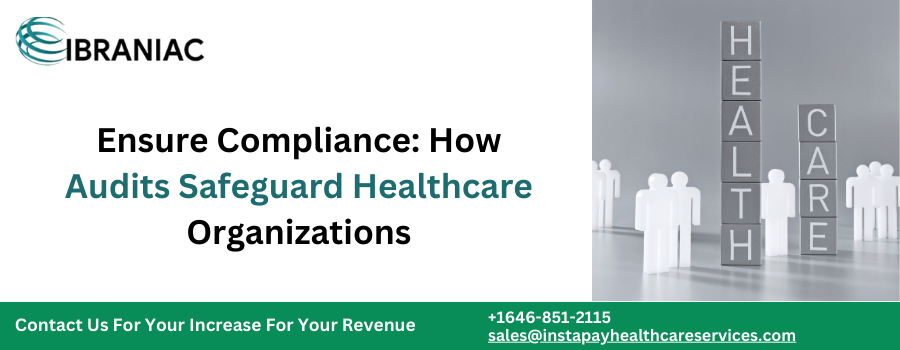
Ensure Compliance: How Audits Safeguard Healthcare Organizations
by admin |May 08, 2024 | 0 comments,
In modern complicated healthcare landscape, compliance with regulatory necessities is paramount. Healthcare corporations need to adhere to a myriad of regulations and policies to ensure patient safety, preserve excellent of care, and uphold ethical standards. Central to accomplishing and retaining compliance are audits, which play a crucial function in identifying regions of non-compliance and mitigating risks. Let's delve deeper into how audits help healthcare groups make sure compliance and avoid the repercussions of failing to meet regulatory standards.
1) Introduction to Compliance in Healthcare
Compliance in healthcare refers to the adherence to laws, rules, pointers, and standards set forth with the aid of regulatory our bodies which includes the Health Insurance Portability and Accountability Act (HIPAA), the Centers for Medicare & Medicaid Services (CMS), and the Joint Commission. It encompasses various factors, such as patient privacy, records safety, billing practices, and exceptional of care.
Regulatory requirements in healthcare are continuously evolving, making it hard for groups to maintain pace with adjustments. Failure to conform with these requirements can result in severe consequences, inclusive of financial consequences, felony sanctions, harm to popularity, and even closure of facilities.
2) Understanding Audits in Healthcare:
Audits are systematic examinations of procedures, practices, and information to assess compliance with hooked up standards and guidelines. In healthcare, audits function proactive measures to assess the effectiveness of internal controls, perceive regions of non-compliance, and put into effect corrective actions.
There are several styles of audits conducted in healthcare, consisting of financial audits, clinical audits, compliance audits, and accreditation audits. Each kind serves a particular reason, ranging from ensuring accurate billing practices to assessing scientific overall performance and adherence to regulatory necessities.
3) The Role of Audits in Ensuring Compliance :
Audits play a pivotal role in making sure compliance within healthcare companies. By systematically reviewing strategies, approaches, and documentation, audits assist perceive gaps, weaknesses, and areas of non-compliance. This enables companies to take corrective actions promptly and put into effect improvements to save you future violations.
Moreover, audits provide valuable insights into the effectiveness of existing compliance programs and the want for added schooling, sources, or adjustments in regulations and strategies. They additionally facilitate transparency and accountability, demonstrating to regulatory authorities and stakeholders a commitment to moral behavior and patient safety.
4) Reducing the Risk of Audits Through Compliance Measures :
Healthcare corporations can reduce the hazard of audits with the aid of implementing robust compliance measures. This consists of developing complete regulations and techniques that align with regulatory necessities, undertaking regular training periods to educate body of workers on compliance requirements and expectancies, and enforcing monitoring mechanisms to track adherence to set up protocols.
By fostering a tradition of compliance and responsibility, corporations can proactively cope with capability issues before they improve into extreme violations. This no longer best reduces the threat of audits but also enhances average operational efficiency and patient care excellent.
5) Penalties and Legal Consequences of Non-Compliance
The outcomes of non-compliance with regulatory necessities in healthcare may be severe. Organizations located in violation may face hefty fines, exclusion from participation in federal healthcare packages, loss of accreditation, and even criminal costs for egregious offenses together with fraud or patient harm.
Furthermore, the reputational damage on account of non-compliance may have some distance-achieving implications, affecting patient consider, investor self assurance, and relationships with regulatory businesses and insurers. Therefore, healthcare agencies should prioritize compliance efforts to mitigate these risks and safeguard their reputation and economic stability.
6) Case Studies: Examples of Audits Helping Healthcare Organizations
Numerous case research show the nice impact of audits on improving compliance inside healthcare agencies. From figuring out billing mistakes and coding discrepancies to uncovering lapses in infection manage protocols, audits were instrumental in riding continuous improvement and fostering a subculture of excellence.
For instance, a large hospital gadget performed a complete compliance audit and determined gaps in documentation associated with remedy management. By enforcing focused schooling packages and improving documentation techniques, the agency became capable of improve compliance rates and decrease the danger of medication errors.
7) The Future of Compliance in Healthcare
As healthcare shipping continues to evolve, so too will the regulatory landscape. Emerging developments including telemedicine, artificial intelligence, and cost-based care fashions will present new challenges and opportunities for compliance. Therefore, healthcare businesses should stay agile and adaptable, embracing generation and innovation while staying vigilant to regulatory changes.
Continuous improvement techniques, including regular audits, overall performance monitoring, and staff education, may be critical for retaining compliance and mitigating risks in the destiny. By embracing a proactive method to compliance management, companies can function themselves for long-time period success in an ever-changing healthcare environment.
Conclusion
In end, audits play a crucial function in ensuring compliance within healthcare organizations by way of figuring out regions of non-compliance, enforcing corrective movements, and reducing the threat of audits, penalties, and legal consequences. By prioritizing compliance efforts and fostering a subculture of duty and continuous improvement, healthcare companies can uphold ethical requirements, enhance patient safety, and mitigate risks successfully.
For expert assistance in ensuring compliance and conducting thorough medical coding audits at affordable cost, contact Instapay Healthcare Services today! Our team of professionals is dedicated to helping healthcare organizations uphold regulatory standards and mitigate risks.
Reach out to us at +1 (646) 851-2115 or email us at sales@instapayhealthcareservices.com to discuss your compliance needs and schedule a consultation. Don't let compliance issues jeopardize your organization's reputation and financial stability. Trust Instapay Healthcare Services for comprehensive compliance solutions tailored to your specific requirements.